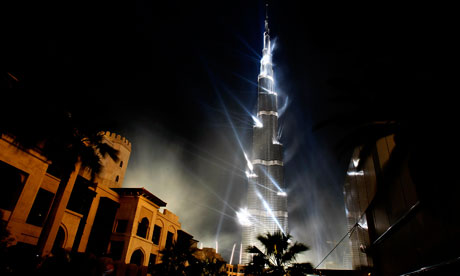中国的摩天大楼热‘可能是经济崩溃的前兆’|商业|卫报
译者 Shierzou
The Burj Khalifa in Dubai, currently the world's tallest building at 828 metres. Photograph: Reuters
迪拜的哈利法塔(Burj Khalifa),高达828米,是目前世界上最高的建筑。相片:路透社
China could be the next country to go bust, if its headlong rush to build ever-taller skyscrapers is a guide to its future economic health.
如果只顾一味地建造更高的摩天大楼,中国可能是下一个面临破产的国家。摩天大楼是未来经济是否健康的一个指标。
According to a study by Barclays Capital, the mania for skyscrapers over the last 140 years is a sure indicator of an imminent crash.
据外资机构巴克莱资本(Barclays Capital)的研究表明,过去140年来,摩天大楼热是标志着经济崩溃即将来临的一个可靠的指标。
It points out that the construction boom that threw up New York's Chrysler and Empire State buildings preceded the New York crash of 1929 and Great Depression.
该机构指出,让纽约的克莱斯勒(New York's Chrysler)和纽约州(Empire State)崛起的建筑热就发生在1929年的纽约股市崩盘和大萧条前夕。
More recently, Dubai built a forest of skyscraping offices, hotels and apartment buildings, including the world's tallest, the Burj Khalifa, before it got into terrible financial difficulties. In 2010 Dubai had to be bailed out by its neighbour, Abu Dhabi, to avoid going bankrupt.
更近一点的,迪拜高耸入云的办公大楼、旅店和公寓大楼鳞次栉比.这当中还包括世界上最高楼——哈利法塔(Burj Khalifa)。这些林立的摩天大楼均建在迪拜陷入可怕的财政困难期前。2010年迪拜为了避免破产而接受阿拉伯联合酋长国首都阿布扎比(Abu Dhabi)的援助。
Bar Cap's report said: "Thankfully for the world economy, there is not currently a skyscraper under construction that is planned to overtake the height of the Burj Khalifa."
巴克莱资本的报告上写道“对世界经济来说,值得庆幸的是,目前没有一幢在建的摩天大楼意欲超过迪拜的哈利法塔。”
However, BarCap said the "unhealthy correlation" between construction of the world's tallest buildings and economic crashes was likely to ensnare China, which is home to half of the world's skyscrapers currently under construction.
但是,巴克莱资本(BarCap)提到全球最高建筑的建造和经济崩溃之间的“不良相关”性有可能让中国大祸临头。中国目前在建的摩天大楼占世界的一半。
India, which has just two skyscrapers, sometimes defined as buildings over 240 metres (787ft) tall, is also on the radar after giving the go-ahead to its first skyscraper building boom, with 14 under way, including the world's second-tallest tower in the financial capital, Mumbai.
但是,巴克莱资本(BarCap)提到全球最高建筑的建造和经济崩溃之间的“不良相关”性有可能要降临在中国身上。中国目前在建的摩天大楼占世界的一半。
Andrew Lawrence, director of property research at Barclays Capital in Hong Kong, said: "Building booms are a sign of excess credit."
香港巴克莱资本房地产调查主任安德鲁•劳伦斯(Andrew Lawrence) 说:“建筑热是信贷扩张的一个信号。
Lawrence said that historically, skyscraper construction had been characterised by bursts of sporadic, but intense activity that coincided with easy credit, rising land prices and excessive optimism, but often by the time the buildings were finished, the economy had slipped into recession.
劳伦斯说,历史上, 摩天大楼的建造具有突发性和偶然性,但是与信贷宽松、土地价格飙升和过分的乐观相吻合的大规模活动;且常是建筑进入竣工时也是经济已进入衰退时。
China is already showing signs of fulfilling the prophecy. Its largest quarterly business survey showed that confidence among property developers had collapsed to a point where it was worse than the lowest point in the 2008 recession.
中国已有迹象表明这个预言要应验了。中国最大的季度性商业调查表明,房地产商的信心指数已跌至比2008年经济衰退期的最低谷还低。
More worringly, the same survey revealed that confidence among construction firms, while a little down on the previous quarter, remained bouyant. Capital Economics, the independent analysts, said Beijing's decision to pump hundreds of billions of dollars into construction projects, bypassing private developers, has prolonged the building boom and potentially stored up a bigger crash.
更令人担忧的是,同一调查显示,建筑公司的信心指数虽与前一季度相比略有下降,但是仍信心十足。独立经济咨询公司 (Capital Economics)说,北京绕开私营发展商,对建设项目注资数百亿美元的决定,已延长了建筑黄金期,同时也有可能会引发更大的房地产崩溃。
Even funds pouring into residential schemes are at risk following years of high-rise developments near factories and businesses dependent on the west for trade. A recession in Europe that drags the rest of the world into a period of lower growth will hurt Chinese exporters, jobs and demand for property.
即便资金是用于住宅项目,但在近工厂区高楼建设的多年发展和国家经济对西方贸易的多年依赖之后上马住宅项目仍存在风险。欧洲的衰退使整个世界陷入低速发展期,这会影响中国的出口,和房地产业的就业和需求。
BarCap said signs of trouble were escalating in China and India. China had the dubious distinction of being the world's "biggest bubble builder," as it erected ever more and higher towers, it said.
巴克莱资本说:有迹象表明中国和印度所问题已进一步恶化。该机构指出,随着中国建造更多更高的大楼,有可疑迹象表明中国已成为世界上“最大的房地产泡沫”。
Home to 53% of the 124 skyscrapers now under construction globally, China is primed to increase its stock of them by 87%. About 80% of new buildings are going up in cities away from developed coastal areas of the Pearl river delta and Yangtze river delta, which Barclays called "evidence of the expanding building bubble".
目前,全球在建的124座高楼中有53%落户于中国, 届时,中国的高楼数的增加87%。在中国约80%的高楼将建在远离发达的珠江三角洲的沿海地区和长江三角洲地区。这一现象便是巴克莱资本所谓的“不断扩大的房地产泡沫”。
Lawrence, who was lead author of the report, said China's property market is already wobbling.
这份报告的第一作者劳伦斯说,中国的房地产市场已岌岌可危。
The number of residential property sales had decreased by 40-50% in Beijing and Shanghai and developers had slashed prices by 5-20%, he said.
在北京和上海住宅地产的销售已狂跌40%至50%,开发商已将房价下调5%-20%。
India, which has just two skyscrapers but is building 14 more, takes top honours for hubris: The second tallest building in the world, the Tower of India, is now under construction in Mumbai.
现仅有两座摩天大楼但欲再建多14幢的印度,获得最狂妄的称号:全球第二高楼—— 孟买的印度塔正在施工中。
Nonperforming loans in India — a substantial number of them to real estate ventures — grew by nearly a third in the first half of this fiscal year, more than triple the average annual growth rate since 2006, according to the Reserve Bank of India.
印度储备银行(The Reserve Bank of India)的数据表明,印度的不良贷款——房地产投机商占相当大的比例----于本财年度的上半年上涨了将近三分之一。这是自2006年以来,不良贷款超过其年均增长率的三倍。
BarCap said: "If history proves to be right, this building boom in India and China could simply be a reflection of a misallocation of capital, which may result in an economic correction for two of Asia's largest economies in the next five years."
巴克莱资本说:“如果历史证明是对的,印度和中国的建造热可能只是是资本分配不当的反映,这可能导致未来五年,这两个亚洲最大的经济体需要作出经济调整。”
A branch of economics founded by followers of US economist Henry George has charted property collapses over the last 100 years and found that booms create the conditions for a downturn around every 18 years.
由美国经济学家亨利•乔治(Henry George)的追随者们创立的经济学分支已绘制了过去100年来楼市崩溃的图表,且发现约每隔18年,房地产热为经济下滑创造了条件。
Fred Harrison, a Georgist and research director of the Land Research Trust, wrote in his 1997 book The Chaos Makers that "by 2007 Britain and most of the other industrially advanced economies will be in the throes of frenzied activity in the land market … Land prices will be near their 18-year peak … on the verge of the collapse that will presage the global depression of 2010."
乔治主义者弗雷德•哈里森(Fred Harrison)是研究信讬基金会的主任。他在1997年发表的书《混乱的制造者》中写道:“至2007年,英国和绝大部分的其他工业发达国家将在狂热的土地市场中苦苦挣扎。。。土地价格将接近其18年来的高峰。。。濒临崩溃边缘,这次的崩溃将预示着2010年全球经济萧条的到来。”
